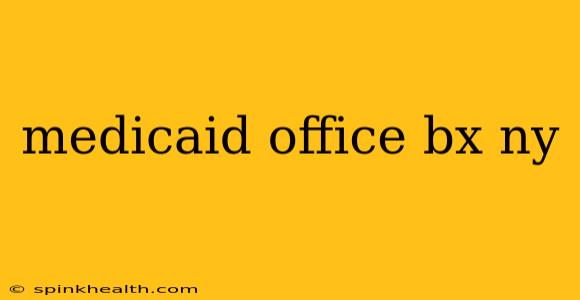The Bronx, a vibrant borough brimming with life and diversity, also faces its share of economic challenges. For many residents, accessing quality healthcare is crucial, and Medicaid plays a vital role in making that possible. But navigating the Medicaid system can feel like traversing a maze. This guide will help you understand how to find and access Medicaid services in the Bronx, NY, making the process clearer and less daunting.
Imagine this: Maria, a single mother working two part-time jobs, recently lost her employer-sponsored health insurance. Worried about her children's health and her own, she started researching Medicaid. She found the process confusing and overwhelming, filled with forms and jargon. This is where this guide steps in – to be your companion in navigating this important system.
Where to Find Medicaid Offices in the Bronx, NY?
Finding the right Medicaid office can be the first hurdle. There isn't one central office; instead, services are often handled through local offices and community partners. The best starting point is the New York State Office of Temporary and Disability Assistance (OTDA) website. Their website provides comprehensive information, including contact details for local offices and eligibility requirements. You can search for local assistance offices using their online tools based on your zip code or address within the Bronx. Additionally, many community health centers and hospitals in the Bronx have staff dedicated to assisting individuals with Medicaid applications.
What Documents Do I Need to Apply for Medicaid in the Bronx?
This is a common question, and rightfully so. Having the necessary documents prepared beforehand streamlines the application process. Generally, you'll need proof of identity (like a driver's license or birth certificate), proof of income (pay stubs, tax returns), proof of residency (utility bills, lease agreement), and Social Security numbers for all household members. However, specific requirements may vary depending on your individual circumstances and the type of Medicaid you're applying for. Don't hesitate to contact the OTDA or a local assistance office for a complete list of required documentation tailored to your situation.
What are the Eligibility Requirements for Medicaid in the Bronx?
Medicaid eligibility criteria are based on income and household size. Generally, your income must fall below a certain threshold to qualify. The exact threshold changes periodically. Families with children, pregnant women, seniors, and people with disabilities often have different eligibility criteria. Again, checking the OTDA website or contacting a local office is the best way to get the most up-to-date and accurate information related to your specific situation.
How Long Does it Take to Get Approved for Medicaid in the Bronx?
Processing times can vary. While some applications might be processed relatively quickly, others may take longer depending on the complexity of the case and the volume of applications being handled at any given time. It is advisable to apply well in advance of needing coverage to allow for processing time. Following up with your local Medicaid office can provide updates on your application's status.
What Happens After I Submit My Medicaid Application?
After submitting your application, you'll typically receive a confirmation. The agency will review your documents and assess your eligibility. If approved, you'll receive a Medicaid card with details on your coverage and benefits. If denied, you'll usually receive a letter explaining the reasons and information on appealing the decision.
Can I Get Help with My Medicaid Application in the Bronx?
Absolutely! Many organizations in the Bronx offer assistance with Medicaid applications. These include community-based organizations, legal aid societies, and hospitals. They can help you gather the necessary documents, fill out the forms correctly, and navigate the process. Reach out to your local community health center or a social services agency to explore these options. Many offer free or low-cost assistance.
Maria, after using this guide and getting help from a local community organization, successfully navigated the process. Her children now have access to the healthcare they need, thanks to her perseverance and access to the right resources. Remember, getting the help you need isn’t a sign of weakness, but rather a smart step towards securing essential healthcare services for you and your family.

